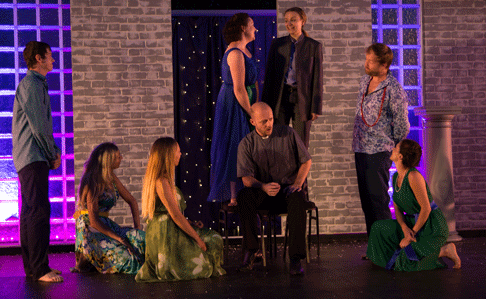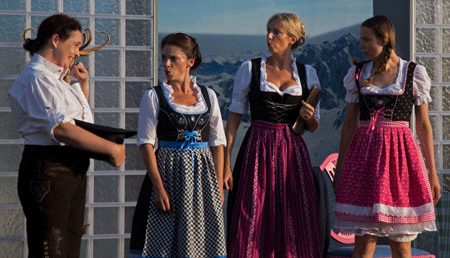Required to devise a fitting entertainment to celebrate the second marriage
of Archduke Joseph, later Emperor Joseph II, to Maria Josepha of Bavaria, at
Schönbrunn in 1765, Gluck offered his regal employerIl Parnaso
confuso, a perfectly proportioned single-act setting of a libretto by
Metastasio typically drawn from Classical mythology. The action takes place on
Mount Parnassus, home of the Muses, where Melpomene (Muse of Tragedy), Erato
(Muse of Lyric Poetry) and Euterpe (Muse of Music) lethargically idle the hours
away among the sacred groves. The lazy spirits are robustly roused from their
lassitude by the arrival of the god, Apollo. With urgency, he shakes them
abruptly from their indolence and demands that they compose celebratory
entertainments for the earthly marriage of Emperor Joseph and his "stella
bavara" (star of Bavaria). Moreover, their creative offerings are required by
the very next morning.
Alarmed by the swift invention and resourceful demanded of them, the
Muses’ self-doubt is complicated by their competitive drive to outshine each
other. And, just when they have put aside their petty jealousies, their brief
harmonious collaborations are rudely disrupted by Apollo’s frantic
reappearance: the mortal marriage has in fact already taken place and they must
present themselves at the matrimonial festivities … now!
Metastasio’s text is atypically ‘light-hearted’, full of topical and
self-referential jests: for example, the Muses agonise over the short time
available to put the piece together. (Metastasio also takes the opportunity to
ridicule two earlier festa teatra by Gluck, Le nozze d’Ercole e
d’Ebe and Tetide, the latter having been composed for the
Joseph’s first marriage to Isabella of Parma in 1752. Neither had employed a
libretto by Metastasio and the Muses resentfully dismiss these works as
old-fashioned and uninventive.) It is a perfect vehicle for director Jeremy
Gray’s characteristic dry wit. I saw Bampton’s Bury Court performance in
August, but — despite the limitations of the stage space and acoustic at St
John’s — this performance seemed to me even more persuasive and dramatically
engaging.
 Orfeo, Euridice, Imeneo and Blessed Spirits
Orfeo, Euridice, Imeneo and Blessed Spirits
The cuckoo clocks and alpine vistas — a sideways glance at the location of
the first performance — inform us that we are in the Swiss Alps; the cool blue
lighting casts a glacial glow. The Muses are malingering languidly in a
high-altitude hostelry until the arrival of ‘Fritz’ (the dull-witted tavern
host, a silent addition to Metastasio’s cast, entertainingly played by Dudley
Brewis), bearing a wicker basket of amusements triggers, some
self-indulgent frolicking, skipping ropes and chocolate hearts keeping the idle
artists occupied. Their trivial inconsequentialities coincide with the
commencement of the overture, the bright strains of CHROMA, under the baton of
Thomas Blunt, rising from behind stage screens adorned with snowy panoramas.
The idiosyncrasies and foibles of the three Muses — Melpomene (Muse of
Tragedy), Erato (Muse of Lyric Poetry) and Euterpe (Muse of Music) were clearly
delineated by Gray’s detailed direction and expertly embodied, dramatically
and musically, by soprano Gwawr Edwards and mezzo-sopranos Anna Staruskevych
and Caryl Hughes, respectively. The demanding, florid writing of Melpomene’s
aria, ‘In un mar che non ha sponde’, requires much control, flexibility and
stamina. (At the first performance, the four solo roles were taken by four
royal princesses — Maria Elisabeth, Maria Amalia, Maria Josepha and Maria
Carolina — the youngest of whom was no more than thirteen years old — and Maria
Elisabeth, in particular, must have had real vocal talent to meet the
challenges of Melpomene’s elaborate arias.) Edwards demonstrated superb
breath control, encompassing the long, twisting lines effortlessly, and her
gleaming, focused tone conveyed Melpomene’s haughtiness and
‘preciousness’ perfectly. She deftly balanced hauteur and humour, donning
fluffy white ear-muffs to drown out her rivalries trivial pursuits and scorning
Apollo’s offer of a restorative swig from an outsized tankard; but, Edwards
also suggested a genuine melancholic sensibility in the heart of the tragic
Muse when, dismayed and morose, she threatened to lay down her pen forever.
Staruskevych engagingly indulged in some mischievous larking about as the
happy-go-lucky Erato but complemented blitheness with elegant phrasing and a
rich, expressive mezzo tone. After some ham-fisted grappling with Euterpe’s
lyre, Staruskevych gracefully communicated Erato’s lyric prowess, supported
by a warm, elegant pizzicato accompaniment supplemented by entrancing violas
and melodious solo bassoon. Hughes was a resourceful Euterpe, her soprano agile
and bright, although occasionally I felt that she was a little under the note.
But, she had calm presence in her graceful aria, unflustered by Fritz’s
fruitless wrestling with her alpenhorn, and blended well with a lovely oboe
obbligato.
Aoife O’Sullivan was outstanding as Apollo, boisterously interrupting the
slothful Muses with a flourish of gold cape and a rousing call for creative
ingenuity. O’Sullivan’s sweet-toned soprano is relaxed and warm across a
wide register and she sensitively shaped the vocal phrases, especially when
supporting the higher-lying line of Edwards in their closing duet. O’Sullivan
can spin a mean trill too: and was no less adroit when whizzing the
alka-seltzer to accompany Edwards’ own sparkling cadential embellishments.
The Orfeo myth may most immediately bring Gluck’s own 1762 opera,
but on this occasion it was Bertoni’s 1776 account of the musical
demi-god’s mythic mission which completed the operatic pairing on this
occasion. In fact, it was at the behest of the castrato Gaetano Guadagni who
had created the title role in Gluck’s opera that Bertoni commenced
composition of the work; he acknowledged the debt he owed to Gluck, and there
are some familiar moods and musical echoes.
Starushkevych was the eponymous quester and O’Sullivan the Euridice whom
he pursues and seeks to restore to life; and the two principals and chorus
(Edwards and Hughes were joined by tenor Thomas Hereford and baritone Robert
Gildon and additional actors) beautifully captured the tenderness and solemnity
of Bertoni’s score. The directorial details of the opening scene also did
much to convince and engage the listener: sombrely attired mourners have
gathered in a subdued chapel to grieve for the lost Euridice, and when
Orfeo’s anguish overcomes him a fellow mourner imperceptibly intervenes to
steer their choral lament to a consoling conclusion. In this instance the venue
was an asset, the imposing columns and cool, shadowy reflections lending an air
of restrained formality.
But, despite the gloom, there were flashes of directorial wit and visual
gags to temper the despondency: a street new-seller hopes the day’s headline
- ‘Snake Death: The Verdict!’ — will tempt a few passers-by, while Orfeo
encounters not a raging Styx on his descent to Hadean realms but a team of
road-diggers bearing ‘No Entry’, ‘One Way’ and ‘Narrow Road’ signs.
A simple lighting design, contrasting infernal red and Elysian green, neatly
underpinned the musical narrative.
In the title role, Starushkevych demonstrated why she won the 2012 Handel
Singing Competition and also Bampton’s own inaugural Young Singers’
Competition in 2013. She exhibited excellent musico-dramatic nous and
vocal stamina. This was a moving performance, in which the mezzo soprano drew
upon her wide range and rich tone — her middle register is especially warm and
firm — to inspire pity and affection; particularly moving was Orfeo’s
third-act lament, accompanied sensitively by oboe, horns and strings. As
Euridice, O’Sullivan sang with effortless ease: her airs danced freely and
captured Euridice’s purity and innocence. The protagonists’ voices melded
affectingly in their Act 3 duet. At Bury Court I had found Hereford’s
characterisation of the role of Imeneo (in this production, a priest) a little
understated, but here he was more animated — a wise and patient spiritual
advisor, consoling and inspiring the bereaved Orfeo. Hereford also projected
more effectively than at Bury Court, thus giving greater credibility to his
role.
The entire cast communicated Gilly French’s economical and direct
translation clearly. The diction was especially clear in Gluck’s
secco recitatives which were stylishly accompanied by harpsichordist
Charlotte Forrest. Placed behind the stage-screen panels which formed the
simple set (in the second half, cold, grey bricks replaced the Alpine
ice-peaks), conductor Thomas Blunt and the musicians of CHROMA maintained very
good ensemble with the singers in the Gluck, although the Bertoni was less
precise in this regard. Perhaps the cast tired a little, or maybe the more
complex musical structures and accompanied recitative adopted by Bertoni
presented fresh challenges.
But, once again, Bampton Classical Opera made a typically persuasive case
for these neglected rarities, skilfully balancing wry irony with serious
music-making.
Claire Seymour
Cast and production information:
Aoife O’ Sullivan, soprano; Gwawr Edwards, soprano; Caryl Hughes,
mezzo soprano; Anna Starushkevych, mezzo soprano; Thomas Herford, tenor; Robert
Gildon, baritone; Jeremy Gray, director/designer; Thomas Blunt, conductor;
CHROMA. Bampton Classical Opera. St John’s Smith Square, London, Tuesday 16th
September 2014.

